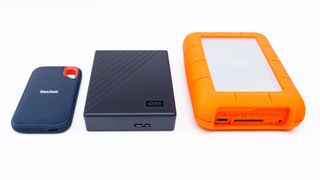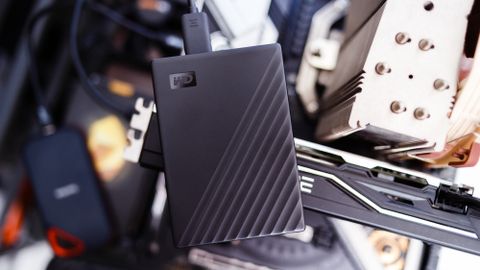Why you can trust Tom's Hardware
Comparison Products
Today, we compare WD’s My Passport to a 2TB LaCie Mobile Drive based on Conventional Magnetic Recording (CMR) technology, as well as a bunch of speedy external SSDs we have tested. As the fastest of the bunch, Samsung’s X5 boasts Thunderbolt 3 performance but is closely followed by SanDisk’s Extreme Pro and LaCie’s Rugged SSD, both high-end 10Gbps devices. Following them, we threw in the low-cost (for an SSD), QLC NAND-based Crucial X8 and the DRAMless Samsung T7 Touch. We also added in an older SanDisk Extreme for good measure.

Transfer Rates – DiskBench
DiskBench is a storage benchmarking tool that allows us to test the transfer or copy performance of a storage device with real data. We test external drives with three file transfers that consist of 25GB of photos (10GB of jpgs and 15GB of RAW photos), 50GB of movies, and 25GB of documents. First, we transfer each folder from a 1TB NVMe SSD to the external device; then we follow up by reading a 3.7GB 7-zip file and a 15GB movie back from the device.










When it came to writing our test folders, the My Passport held up well to LaCie’s Mobile Drive, only lagging it a few MBps here or there. WD’s My Passport even surpassed it during the photo transfer. In reading back our large .zip and movie files, again, the LaCie lead the WD drive by a bit. Compared to flash, as we would expect, these HDDs are much slower. So if you prioritize speed at all, you should probably opt for an SSD.
Trace Testing – PCMark 10 Storage Test: Data Drive Benchmark
PCMark 10 is a trace-based benchmark that uses a wide-ranging set of real-world traces from popular applications and common tasks to measure the performance of a storage device. To test drives that store files rather than applications, we utilize the Data Drive Benchmark.



Averaging 64 MBps in bandwidth and scoring similarly to LaCie’s Mobile Drive in this test, WD’s My Passport provides enough performance to compete with CMR drives. It of course lags the flash competitors significantly with significantly higher latency.
Synthetics - ATTO
ATTO is a simple and free application that SSD vendors commonly use to assign sequential performance specifications to their products. It also gives us insight into how the device handles different file sizes.


ATTO is a simple and free application that SSD vendors commonly use to assign sequential performance specifications to their products. It also gives us insight into how the device handles different file sizes.
Synthetics - iometer
iometer is an advanced and highly configurable storage benchmarking tool that vendors often use to measure the performance of their devices.








Sequential performance comes in a little higher in our iometer testing, bursting up to 127/128 MBps read/write, and random performance is about what one should expect from an HDD. WD tweaked to the My Passport to perform pretty responsively under random writes, too.
Sustained Write Performance, Cache Recovery and Temperature





Write speed and temperature are two important and inter-related metrics for external devices. We threw in this one last test to measure the performance of the drive over a 15-minute window, writing to the full span of the drive. This test reveals if the drive has a pseudo-SLC cache, which is a small portion of faster-programmed flash that absorbs incoming write workloads. We also monitor cache recovery via multiple idle rounds.
When possible, we also log the temperature of the drive via the S.M.A.R.T. data to see when (or if) thermal throttling kicks in and how it impacts performance. Bear in mind that results will vary based on the workload and ambient air temperature.
As one would expect with a hard drive, WD’s My Passport doesn’t feature a write cache. But, unlike the inconsistent write performance we’ve seen with other SMR HDDs, WD’s My Passport writes extremely consistently. It even surpasses the LaCie Mobile Drive in total writes by the time the 15 minutes is up, writing nearly 30GB more. This pales in comparison to what a good SSD can do, but is impressive for a mobile hard drive nonetheless. And, temps were never an issue when testing.
MORE: Best SSDs
MORE: How We Test HDDs And SSDs
MORE: All SSD Content

Sean is a Contributing Editor at Tom’s Hardware US, covering storage hardware.
